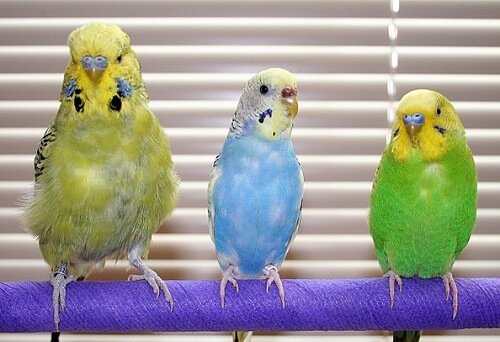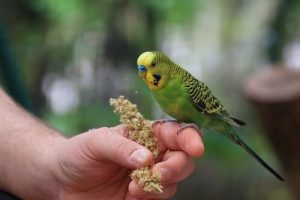Parakeet Illnesses

Parakeets are beautiful animals that can live for around 10 to 12 years. However, making sure that they have a long life is not an easy task as there are many different parakeet illnesses.
Some illnesses only affect feathers or beaks and therefore are quite bearable. But there are others that can threaten this fantastic bird’s life. Some illnesses have treatments and others can even be contagious for humans.
This being the case, knowing the basic information about parakeet illnesses is extremely important for owners.
Infectious illnesses
Just like human beings, parakeets can suffer from infections. These can be caused by fungus, viruses, or bacteria. The most well-known are the polyomavirus, candidiasis, salmonella, and sour crop.

Some illnesses such as avian polyomavirus only appear in chicks. Having a spacious and well-ventilated cage is the best way to avoid this type of infection. Meanwhile, yeast can transmit megabacteria, although there are anti-fungal medications that are very effective.
One of the most delicate conditions that this species can develop is sour crop. This can occur when vegetables such as lettuce are not washed well or still contain traces of pesticides. The symptoms are notorious: purple skin, depression, loss of appetite, and a dirty beak. Three to five days is normally enough before the poor bird dies.
It’s important to pay attention to your bird’s basic needs, such as the state of the food in their cage. This is especially true if it is vegetables and grains. If you notice that your bird is thin, drinking a lot of water, or its feathers have changed, the best thing to do is go straight to a vet.
Parasitic infections
There are many parasitic organisms that can cause parakeet illnesses. For example, knemidocoptes mites travel through the air and can affect a parakeet’s legs and beak. If your bird shows signs of flaking with small pits, it’s because they’ve been infected.
But there are also conditions caused by endo-parasites which live inside your pet‘s body. Often, this type of infection causes decay, weakness, diarrhoea, and loss of appetite.
As you can see, many parakeet illnesses influence their digestive system. Therefore, it is logical for owners to check their bird’s excrement, mood, and eating habits.
Skin and plumage illnesses
A parakeet’s external appearance can also be affected by certain clinical conditions. This is the case with Ema syndrome, characterised by scabbing and bruising on the wings. Blood marks on the affected areas can also be a sign.
Furthermore, red mites are an ecto-parasite that live on the underside of the wings. Affected birds feel itchy and tend to pluck their own feathers to relieve the itching. As a result, it’s important to take care of your bird’s hygiene and rub alcohol on the affected areas. Cleaning their cage is also very important for prevention.
Parakeets can also experience problems molting . These can include French molt or abnormal molting, which can come as a consequence of other viruses like the Polyomavirus.
Some are the same as human illnesses
Parakeets are also susceptible to suffering illnesses which we all know and have experienced such as colds, diarrhoea, fatty liver disease, and constipation. Furthermore, they can fracture their legs or wings.
Additionally, the respiratory problems we suffer are the same for them too. These birds can suffer from asthma and bronchitis or be affected by allergies. Some of them can even suffer from epilepsy.

Not only that, parakeets can also suffer from tumours and cancer. Specialist vets claim this can occur between two and six years old. The organs affected are almost always the kidneys, skin, digestive system, and reproductive organs.
Other parakeet illnesses
Goiter can affect almost any bird, but in parakeets it’s particularly unique. This illness is due to a lack of iodine, which causes changes to the thyroids. This results in your parakeet having a much deeper voice.
Parrot Fever is deadly and people can catch it. What’s particularly noticeable is that the bird is aware of their condition and will move themselves into a corner in order to not infect any others. So, if you notice this behavior you should be very concerned.
Lastly, it’s worth outlining that one of the most serious parakeet illnesses is caused internally. Depression is fatal for this bird. Your parakeet will stop eating and begin to pluck its own feathers, becoming more stressed. If you can’t help improve their mood they can die.
